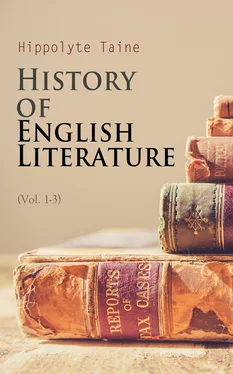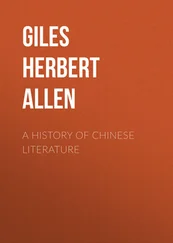[455]In Webster's "Duchess of Malfi" there is an admirable accouchement scene.
[456]This is, in fact, the English view of the French mind, which is doubtless a refinement, many times refined, of the classical spirit. But M. Taine has seemingly not taken into account such products as the Medea on the one hand, and the works of Aristophanes and the Latin sensualists on the other.—Tr.
[457]See Hamlet, Coriolanus, Hotspur. The queen in "Hamlet" (V. 2) says: "He (Hamlet) is fat, and scant of breath."
[458]Middleton, "The Honest Whore," part I. IV. 1.
[459]Beaumont and Fletcher, "Valentinian, Thierry and Theodoret." See Massinger's "Picture," which resembles Musset's "Barberine." Its crudity, the extraordinary repulsive energy, will show the difference of the two ages.
[460]Massinger's Works, ed. H. Coleridge, 1859, "Duke of Milan," II. 1.
[461]Ibid. V. 2.
[462]Massinger, "The Fatal Dowry"; Webster and Ford, "A late Murther of the Sonne upon the Mother" (a play not extant); "'Tis pity she's a Whore." See also Ford's "Broken Heart," with its sublime scenes of agony and madness.
[463]Ford's Works, ed. H. Coleridge, 1859.
[464]Ibid. IV. 3.
[465]Ford's Works, ed. H. Coleridge, 1859, IV. 3.
[466]Ibid. IV. 3.
[467]Ibid. V. 5.
[468]Ibid. V. 6.
[469]Webster's Works, ed. Dyce, 1857, "Duchess of Malfi," I. 1.
[470]The characters of Bosola, Flaminio.
[471]See Stendhal, "Chronicles of Italy, The Cenci, The Duchess of Palliano," and all the biographies of the time; of the Borgias, of Bianca Capello, of Vittoria Corombona.
[472]Ferdinand, one of the brothers, says (II. 5): "I would have their bodies Burnt in a coal-pit with the ventage stopp'd, That their curs'd smoke might not ascend to heaven; Or dip the sheets they lie in in pitch or sulphur, Wrap them in't, and then light them as a match; Or else to boil their bastard to a cullis, And give't his lecherous father to renew The sin of his back."
[473]"Duchess of Malfi," IV. 1.
[474]Ibid. IV. 2.
[475]"Duchess of Malfi," IV. 2.
[476]"When," an exclamation of impatience, equivalent to "make haste," very common among the old English dramatists.—Tr.
[477]"Duchess of Malfi," IV. 2.
[478]Ibid. V. 5.
[479]Ibid. V. 4 and 5.
[480]"Vittoria Corombona," I. 2.
[481]Webster Dyce, 1857, "Vittoria Corombona," p. 20, 21.
[482]Ibid. III. 2, p. 23.
[483]"Vittoria Corombona," III. 2, p. 24.
[484]Compare Mme. Marneffe in Balzac's "La Cousine Bette."
[485]"Vittoria Corombona," V. last scene, pp. 49, 50.
[486]Hence the happiness and strength of the marriage tie. In France it is but an association of two comrades, tolerably alike and tolerably equal, which gives rise to endless disturbance and bickering.
[487]See the representation of this character throughout English and German literature. Stendhal, an acute observer, saturated with Italian and French morals and ideas, is astonished at this phenomenon. He understands nothing of this kind of devotion, "this slavery which English husbands have had the wit to impose on their wives under the name of duty." These are "the manners of a seraglio." See also "Corinne," by Mme de Staël.
[488]A perfect woman already: meek and patient.—Heywood.
[489]See, by way of contrast, all Molière's women, so French; even Agnes and little Louison.
[490]Beaumont and Fletcher, Works, ed. G. Colman, 3 vols. 1811, "Philaster", V.
[491]Like Kaled in Byron's "Lara."
[492]"Philaster," IV.
[493]Ibid. V.
[494]Beaumont and Fletcher, "The Fair Maid of the Inn," IV.
[495]Beaumont and Fletcher, "Thierry and Theodoret, The Maid's Tragedy, Philaster." See also the part of Lucina in "Valentinian."
[496]"Thierry and Theodoret," IV, 1.
[497]Beaumont and Fletcher, "The Maid's Tragedy," I.
[498]Pauline says, in Corneille's "Polyeucte" (III. 2): "Avant qu'abandonner mon âme à mes douleurs, Il me faut essayer la force de mes pleurs; En qualité de femme ou de fille, j'espère Qu'ils vaincront un époux, ou fléchiront un père. Que si sur l'un et l'autre ils manquent de pouvoir, Je ne prendrai conseil que de mon désespoir. Apprends-moi cependant ce qu'ils ont fait au temple."
We could not find a more reasonably and reasoning woman. So with Éliante, and Henrietta in Molière.
[499]Ford's "Broken Heart," III. 2.
[500]Ibid. 5.
[501]Ford's "Broken Heart," IV. 2.
[502]Schopenhauer, "Metaphysics of Love and Death." Swift also said that death and love are the two things in which man is fundamentally irrational. In fact, it is the species and the instinct which are displayed in them, not the will and the individual.
[503]"Cymbeline," IV. 2.
[504]The death of Ophelia, the obsequies of Imogen.
[505]"Philaster," I.
[506]Beaumont and Fletcher, "The Faithful Shepherdess," I.
[507]Ibid, II.
[508]See the description in Nathan Drake, "Shakspeare and his Times."
[509]Beaumont and Fletcher, "The Faithful Shepherdess," I.
[510]Ibid. IV.
[511]Ibid.
[512]Beaumont and Fletcher, "The Faithful Shepherdess," V. Compare, as an illustration of the contrast of races, the Italian pastorals, Tasso's "Aminta," Guarini's "Il Pastor fido," etc.
Table of Contents
SECTION I.—The Man—His Life
Table of Contents
When a new civilization brings a new art to light, there are about a dozen men of talent who partly express the general idea, surrounding one or two men of genius who express it thoroughly. Guillen de Castro, Perez de Montalvan, Tirzo de Molina, Ruiz de Alarcon, Agustin Moreto, surrounding Calderon and Lope de Vega; Crayer, Van Oost, Rombouts, Van Thulden, Vandyke, Honthorst, surrounding Rubens; Ford, Marlowe, Massinger, Webster, Beaumont, Fletcher, surrounding Shakespeare and Ben Jonson. The first constitute the chorus, the others are the leading men. They sing the same piece together, and at times the chorist is equal to the solo artist; but only at times. Thus, in the dramas which I have just referred to, the poet occasionally reaches the summit of his art, hits upon a complete character, a burst of sublime passion; then he falls back, gropes amid qualified successes, rough sketches, feeble imitations, and at last takes refuge in the tricks of his trade. It is not in him, but in great men like Ben Jonson and Shakespeare, that we must look for the attainment of his idea and the fulness of his art. "Numerous were the wit-combats," says Fuller, "betwixt him (Shakespeare) and Ben Jonson, which two I behold like a Spanish great galleon and an English man-of-war. Master Jonson (like the former) was built far higher in learning; solid, but slow in his performances. Shakespeare, with the English man-of-war, lesser in bulk, but lighter in sailing, could turn with all tides, tack about and take advantage of all winds, by the quickness of his wit and invention."[513] Such was Ben Jonson physically and morally, and his portraits do but confirm this just and animated outline: a vigorous, heavy, and uncouth person; a broad and long face, early disfigured by scurvy, a square jaw, large cheeks; his animal organs as much developed as those of his intellect: the sour aspect of a man in a passion or on the verge of a passion; to which add the body of an athlete, about forty years of age, "mountain belly, ungracious gait." Such was the outside, and the inside is like it. He was a genuine Englishman, big and coarsely framed, energetic, combative, proud, often morose, and prone to strange splenetic imaginations. He told Drummond that for a whole night he imagined "that he saw the Carthaginians and Romans fighting on his great toe."[514] Not that he is melancholic by nature; on the contrary, he loves to escape from himself by free and noisy, unbridled merriment, by copious and varied converse, assisted by good Canary wine, which he imbibes, and which ends by becoming a necessity to him. These great phlegmatic butchers' frames require a generous liquor to give them a tone, and to supply the place of the sun which they lack. Expansive moreover, hospitable, even lavish, with a frank imprudent spirit,[515] making him forget himself wholly before Drummond, his Scotch host, an over-rigid and malicious pedant, who has marred his ideas and vilified his character.[516] What we know of his life is in harmony with his person; he suffered much, fought much, dared much. He was studying at Cambridge, when his stepfather, a bricklayer, recalled him, and taught him to use the trowel. He ran away, enlisted as a common soldier, and served in the English army, at that time engaged against the Spaniards in the Low Countries, killed and despoiled a man in single combat, "in the view of both armies." He was a man of bodily action, and he exercised his limbs in early life.[517] On his return to England, at the age of nineteen, he went on the stage for his livelihood, and occupied himself also in touching up dramas. Having been challenged, he fought a duel, was seriously wounded, but killed his adversary; for this he was cast into prison, and found himself "nigh the gallows." A Catholic priest visited and converted him; quitting his prison penniless, at twenty years of age, he married. At last, four years later, his first successful play was acted. Children came, he must earn bread for them; and he was not inclined to follow the beaten track to the end, being persuaded that a fine philosophy—a special nobleness and dignity—ought to be introduced into comedy—that it was necessary to follow the example of the ancients, to imitate their severity and their accuracy, to be above the theatrical racket and the common improbabilities in which the vulgar delighted. He openly proclaimed his intention in his prefaces, sharply railed at his rivals, proudly set forth on the stage[518] his doctrines, his morality, his character. He thus made bitter enemies, who defamed him outrageously and before their audiences, whom he exasperated by the violence of his satires, and against whom he struggled without intermission to the end. He did more, he constituted himself a judge of the public corruption, sharply attacked the reigning vices, "fearing no strumpet's drugs, nor ruffian's stab."[519] He treated his hearers like schoolboys, and spoke to them always like a censor and a master. If necessary, he ventured further. His companions, Marston and Chapman, had been committed to prison for some reflections on the Scotch in one of their pieces called "Eastward-Hoe"; and the report spreading that they were in danger of losing their noses and ears, Jonson, who had written part of the piece, voluntarily surrendered himself a prisoner, and obtained their pardon. On his return, amid the feasting and rejoicing, his mother showed him a violent poison which she intended to put into his drink, to save him from the execution of the sentence; and "to show that she was not a coward," adds Jonson, "she had resolved to drink first." We see that in vigorous actions he found examples in his own family. Toward the end of his life, money was scarce with him; he was liberal, improvident; his pockets always had holes in them, and his hand was always ready to give; though he had written a vast quantity, he was still obliged to write in order to live. Paralysis came on, his scurvy became worse, dropsy set in. He could not leave his room, nor walk without assistance. His last plays did not succeed. In the epilogue to the "New Inn" he says:
Читать дальше












